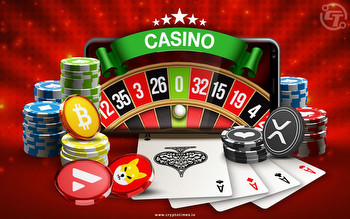Simple Stakes to Sophisticated Screens: Evolution of Online Gambling

From ancient times, the thrill of chance has captivated human imagination. The allure of potential reward versus the risk of loss has created games, rituals, and institutions dedicated to this eternal dance.
From dice games in Mesopotamia to the lavish roulette tables in Monaco, every culture and era have had its signature gambling practices. However, the closing decades of the 20th century and the dawn of the 21st brought forth a revolution that transformed this age-old pastime: the digitization of gambling.
As the world went online, so did casinos, sports betting, and all forms of wagering. The digital era didn’t just transplant gambling into the virtual realm; it reinvented it, creating a hybrid experience that combined tradition with technology, physicality with virtuality.
Genesis of Online Gambling
Emerging from the digital chaos of the 1990s, the first online casinos represented a radical rethinking of what gambling could be. Initially greeted with skepticism, these virtual platforms promised casino fun without the logistical hassles. As internet penetration grew, these platforms evolved.
They became more sophisticated, offering a larger array of games and betting options. The leap to live games marked a significant stride, merging the authentic feel of physical casinos with online convenience.
As technology and internet speeds improved, so did the offerings of these platforms. Enhanced graphics, better sound quality, and user-friendly interfaces became standard. Online gambling was no longer a novelty but an industry in its own right, competing head-to-head with its brick-and-mortar counterparts.
Sports Betting, Gambling and Racing Online
Sports and betting have always been bedfellows, but the internet changed the nature of this relationship. No longer limited by geographical constraints, betting enthusiasts could place wagers on events happening continents away. This global access democratized sports betting, making it accessible to anyone with an internet connection.
Moreover, as technology continued to evolve, so did the manner of betting. Live betting, enabled by real-time data streams, allowed punters to place wagers as events unfolded. This dynamic form of betting, combined with the global access previously mentioned, transformed the sports betting industry into a 24/7 juggernaut.
Advancement in Graphics and Game Design
The digital aesthetic of online casinos in their early days was primitive, heavily influenced by the tech limitations of the time. However, as video game graphics evolved, becoming more lifelike and intricate, so did online casino designs. Richer graphics, cinematic animations, and high-quality soundtracks soon became the norm, enhancing player immersion.
Developments like Flash and HTML5 allowed online casinos to offer games that were not only visually appealing but also more complex and engaging. Slot games, for example, began to feature detailed storylines, bonus rounds, and innovative gameplay mechanics, making them more akin to video games than simple spin-the-reel machines.
Rise of Live Casino Games
With advancements in video streaming technology, online casinos identified an opportunity to recreate the brick-and-mortar casino experience virtually. Live casino games, with real dealers and real-time play, became the rage. Players could engage in a game of blackjack, roulette, or poker, interact with the dealer, and even chat with fellow players, all from the comfort of their homes.
This convergence of the physical and digital realms bridged a gap in the online gambling experience. While the convenience of online play was undeniable, many players missed the human touch of a physical casino. Live casino games addressed this, marrying convenience with authenticity.
Mobile Gambling – Casino in Your Pocket
The ubiquitous spread of smartphones fundamentally altered the online gambling landscape. Recognizing the potential of mobile gaming, online casinos began crafting mobile-optimized versions of their platforms, and later, dedicated apps. These apps, designed specifically for smaller screens, offered the full breadth of the casino experience on the go.
Soon, players could spin slots while waiting for a bus, or engage in a quick poker game during a lunch break. The world became a casino, with games accessible anytime, anywhere. This shift to mobile also paved the way for location-based gambling offerings, further personalizing the experience for users.
Implementation of AR and VR
Virtual Reality (VR) and Augmented Reality (AR) represent the bleeding edge of digital immersion. In the realm of online gambling, these technologies are heralding a new era. VR casinos, for instance, provide an all-encompassing experience, where players, equipped with VR headsets, can explore casino floors, interact with other avatars, and play games in hyper-realistic digital environments.
Conversely, AR casinos superimpose digital elements onto the real world. Imagine playing poker on your living room table with digital cards and chips, or seeing a slot machine on your coffee table. Both these technologies, while still in nascent stages, are poised to redefine the boundaries of online gambling.
Regulatory Evolution and Player Safety
The rapid growth of online gambling necessitated stringent oversight. Initially, the digital nature of the activity presented regulatory challenges. However, as the sector matured, governments and international bodies stepped in, formulating rules and standards to protect players.
These regulations, while ensuring fair play and transparent operations, also provided a framework for player safety and data protection. As trust is paramount in gambling, these regulatory measures bolstered the industry’s credibility, assuring players that they were engaging in a safe and fair activity.
Blockchain and Cryptocurrencies
Blockchain technology, with its promise of transparency and security, found a natural ally in online gambling. Cryptocurrencies, powered by blockchain, offered a new mode of transaction—fast, anonymous, and secure. For players, this meant quicker payouts, lower fees, and an added layer of privacy.
Moreover, blockchain’s inherent transparency allowed for the creation of “provably fair” games. In such games, every outcome, every card shuffle, every dice roll, could be verified for fairness, providing players with unprecedented levels of trust in online gambling platforms.
Conclusion
In observing the story of online gambling, we see a reflection of the broader narrative of human progress and technological innovation. It’s a testament to our innate desire for entertainment, competition, and reward.
The digital realm’s myriad possibilities have reshaped how we engage with the age-old thrill of chance, creating an industry that’s both reflective of its historical roots and anticipative of future technological wonders.
As we stand at this juncture, looking back at the evolution and forward into the horizon, we can only imagine the new forms, challenges, and excitements the next chapter of online gambling holds.
With emerging technologies and evolving player preferences, we are set to experience a future where the line between the real and the virtual blurs further, offering unparalleled experiences and possibilities.






































